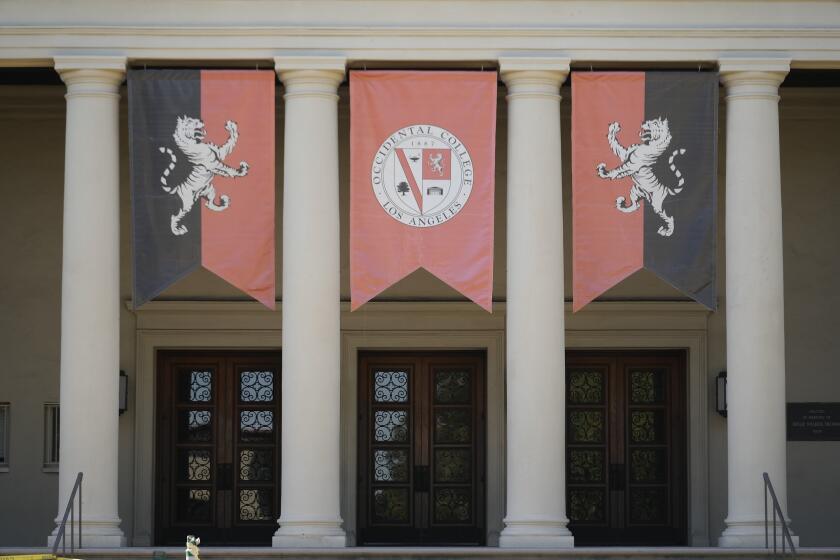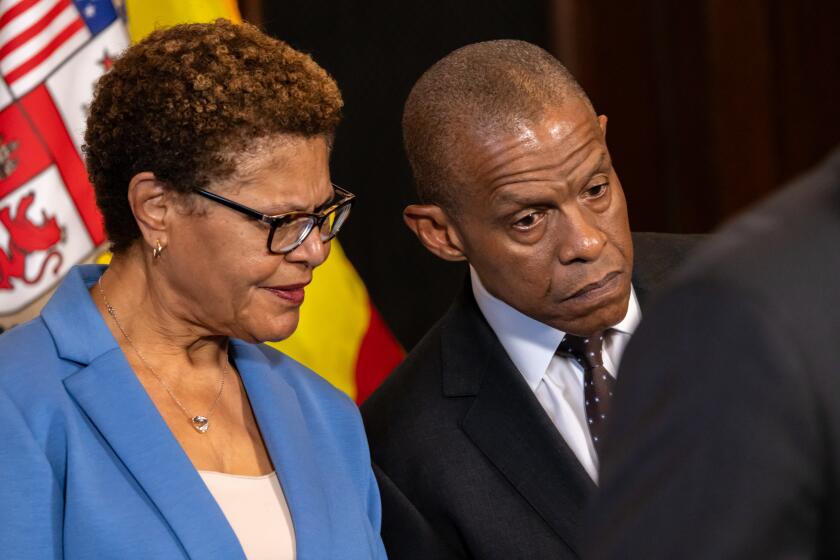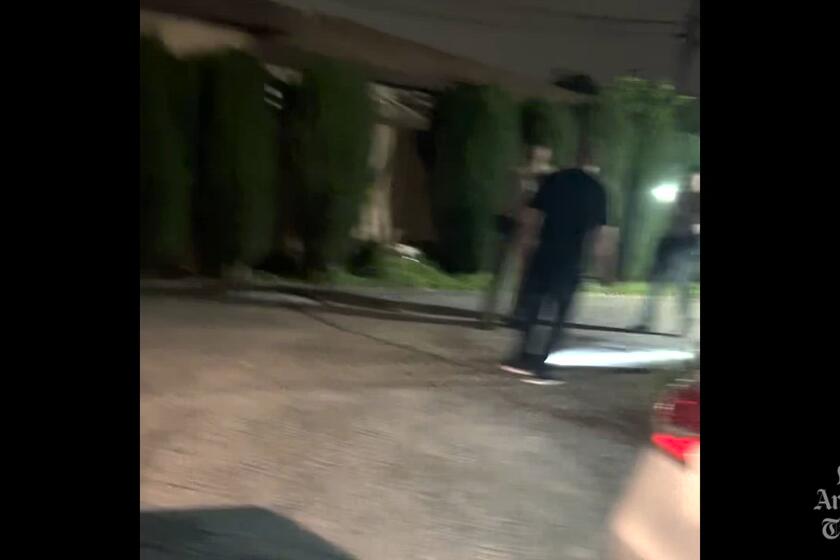What’s L.A.’s big problem?
The Opinion page asked various Angelenos what troubles Los Angeles faces in 2007. Here’s was they had to say.
Creator-producer of "Mortified"
Los angeles, City of Brotherly Loathe. We live in a psychologically challenging town. Sure, we've got great food, scenery, history, art and people. Just don't tell anyone that you actually feel that way.
L.A.'s big problem is that no one who lives here is allowed to officially admit they like it. Those who confess affection are immediately branded with scarlet letters deeming them plastic or shallow.
Outsiders love to tell me how phony everyone in L.A. is. After all, they've seen "Entourage." But people are phony everywhere . . . and nice everywhere. You find the city you're looking for. I've looked for and found a city of people who dream huge and fall hard and get up to try again. I admire that. Even when I'm too plastic and shallow to admit it.
So I suggest that L.A. change its motto from the relatively decorative "City of Angels" to the more relevant "City of Insecurity & Creeping Sense of Inadequacy." In a town built on battered ambitions, celebrating our shared shortcomings is our best hope to achieve L.A.'s long-overdue sense of civic pride.
Author of "Are Cops Racist?" and a fellow at the Manhattan Institute
Los angeles has the opportunity to change criminology forever -- if it would only fund its police force adequately. Los Angeles Police Chief William J. Bratton is driving crime down in L.A. through his data-driven policing methods. But he is working with one hand tied behind his back because of the LAPD's enormous understaffing.
Received wisdom holds that crime levels are determined by poverty and other "root causes" and that police can only respond to infractions after the fact. The Bratton policing revolution has disproved that by holding local police commanders accountable for violence reduction and by basing policing strategies on rigorously analyzed, up-to-the-minute crime data.
While violence is rising across the country, crime continues to go down in those cities where Bratton's policing concepts hold sway -- besides L.A., most notably in New York. But criminologists still look the other way.
Give the LAPD more cops -- at least double the meager 1,000 promised over the next five years -- and the ensuing crime rout would allow law-abiding residents of South Los Angeles to lead their lives in relative peace. And even the most anti-police theoreticians could no longer ignore the power of properly managed law enforcement to bring safety to troubled neighborhoods.
Television and film writer
Our city's most pressing problem is change. Everything around here changes too much, too fast. You come back from lunch and life is nowhere near where you left it. Los Angeles has always been at the forefront of innovation, so it won't be easy finding the cutting edge of stagnation, but it has to happen.
No city buys into "change is good" like Los Angeles. New. Newer. Newest. We want it all. But look around at the sunken eyes of everyone in town flailing to keep up. We're tired. We're lost. Our complexions aren't even that good.
Sure, L.A. has lots of problems that need changing. But L.A. will always have lots of problems. It's a subversive thought, but if it's broken, we don't really have to fix it.
We need to embark on a program of sweeping permanence in which we convince the populace that everything at this very moment is fast enough, light enough, loud enough, sweet enough, profitable enough, likable enough, stain-resistant enough.
We have to start living in the now. Or at least the soon. Starting Jan. 1, we need to gather our most inventive minds and find a way of keeping everything exactly the same. On Jan. 2, the mayor should officially announce that, like a dream house, Los Angeles is finally finished.
Retired senior pastor of the First AME Church and lecturer at the USC School of Religion
Los angeles faces a challenge that will either make us or break us: to have diversity without adversity -- different folks and folks who are different not allowing their differences to make a difference.
The sunshine ranks high as the magnet pulling people west, but pluralism and multiculturalism are the gold rush of this millennium. We are spiritually hungry for each other, for the best in each other -- and we know that our social problems are not because of accident or descent, but to ascent that is hindered by closed opportunities that cause the upward bound to lament and resent.
The world is watching this one-of-a-kind City of Angels to see if liberty and justice in fact work for all.
Co-founder of blogging.la
Los angeles has been a pioneer when it comes to equal rights for just about any group of people you can think of. The glaring exception: left-hand-turners.
The city's glaring lack of left-turn lanes and left-turn signals shows a blatant directionist bias toward people turning right. This oppression has a trickle-down effect: People are so ashamed of their need to turn left that they hide it until the very last second, sometimes not putting on their blinker until they are at the stoplight.
But people aren't just ashamed, they are self-hating. When was the last time you saw someone who was turning left actually pull out into the intersection to help his fellow left-turners? Never, that's when. We should not simply tolerate left turns in this city, we should liberate them.
Author of "City of Quartz" and "Planet of Slums"
In a metropolis that is world renowned for conspicuous consumption and luxury lifestyles, 640,000 children (according to 1999 census data for L.A. County) are officially poor. Most of them are growing up in substandard housing, often in extremely violent neighborhoods, without medical insurance and subject to episodic hunger. Nearly half of them will fail to graduate from high school with their age cohort.
Several years ago, state Sens. Gloria Romero and Richard Alarcon conducted groundbreaking hearings about poverty -- especially child poverty -- in California. The hearings were poorly covered by The Times and ignored by most of the political establishment. The most straightforward measure of the decency of any society is the public attention given to the health and happiness of small children regardless of race or class. We flunk.
Author of "You're Not the Boss of Me"
My middle-schooler, like all budding teens, is turning into a night owl. She stays up late and has a hard time getting up in the morning. Sleep researchers call this "phase delay": a geyser of growth hormones that alter the pubescent circadian rhythm. Parents call it a major pain. Educators ignore it altogether.
That teenagers need more sleep is not a moral issue, merely a biological fact. Just ask the parent of any 9th grader how hard it is to get their kid out the door for a 7:45 a.m. school bell. But our puritanical, agrarian society holds it against them, and our school schedules punish them for something they can't help.
Across the country, a movement is afoot to delay the start time of the school day. Here in Los Angeles, Councilman Tom LaBonge is pressing the L.A. Unified School District to hold off the first period bell till 8:30 a.m. (which, if you ask me, is still not late enough). School districts that have modified their high school schedules show increased attendance, a drop in teen auto accidents and better grades.
Of course, a later start time opens a can of worms. What will happen to commuter traffic, bus schedules, after-school programs? Still, it's time to address why our largely urban society is so stuck on an outdated agrarian timetable. Nobody needs to milk the cows around here. But we could all use a little more zzzzzz.
Political scientist at Cal State Fullerton and executive director of the Neighborhood Council Review Commission
Los angeles is divided between information haves and have-nots. Only a few of us really look at the physical city the way a New Yorker learns geography from the subway map. How many of us know the difference between the city and the county, and does it really help to call them both Los Angeles? How many of us know that every neighborhood is entitled to help form a neighborhood council?
In a democracy, everybody's voice is supposed to count the same. But those who know how things work have a big advantage. The more you know, the more you participate, and the more effective your participation will be. If you register to vote, you'll get political mail. Knowledge can help ordinary people stand on an equal footing with the elite.
But there are costs to finding out what's going on, and lots of people are just trying to get by. For those with language barriers, or who are not citizens, the barriers to political knowledge can be insurmountable.
If I had my way, Los Angeles would set a national model for information equality, aggressively targeting the young, the isolated and the hard to reach.
Author of "Audiotopia: Music, Race and America"
Last spring, those glorious marcha madness days, L.A. proved that we're good -- really good -- when we want to be. Washington tries to turn migrants into felons and the border into a Great Walled prison with a Boeing contract; we fill the streets, nearly a million strong.
Local pundits waxed on about a sleeping giant waking up (with help from their favorite morning radio DJs), but let's be clear: The giant has never been asleep. It was the rest of the city that needed to wake up.
So the big L.A. problem is not the fact of immigration -- undocumented or not -- but the city's conception of it, how we see ourselves. It's fixable. The mirrors are everywhere, ready for a massive dose of daily urban self-reflection. We're a migrant city -- a hub for exiles, a crossroads of cultures.
This year's immigration debates were rife with cruel and myopic political theatrics. We need to keep our eyes on what's happening offstage, in the audience, on the streets -- a city that's being reborn and re-imagined by immigrants who are invisible only because too many still choose not to see them.
Architect
Los angeles is a city of innovative architecture, but it is defined less by buildings than the enormous scale of its infrastructure -- railways, water works, power grids and, of course, the ubiquitous freeways.
It all addresses obvious practical problems: how to move cars, water, power and trains. But the unintended consequence is de facto "zoning by infrastructure" -- subdivisions of use, sociology, affluence and poverty, unanticipated by the engineers who planned the concrete rivers and freeways.
Let's re-imagine the infrastructure. Let's conceive of it no longer simply as a way to solve technical problems but as a multipurpose planning-and-design instrument to reconnect disparate zones of the city.
Where to begin? The L.A. River, that Maginot Line of poured concrete and infrequent high water that winds from the mountains to the ocean.
Make the river a public amenity. Dam it. Sail in it. Bring adjacent communities to its edges. Bridge it and inhabit the bridges -- commerce, recreation, housing and education will span the renewed river. Clean the water, store it, then release it as a source of hydroelectric power.
Where to start? Between the 1st Street and 6th Street bridges, where the river separates Latino Boyle Heights and downtown. Join the communities at the river.
Author, most recently, of "There Will Never Be Another You"
Traffic is our worst problem in Los Angeles. Too many cars.
It's not just the cars, it's the drivers. L.A. is a city of glorious diversity, but that means many of our citizens come from someplace else. Places where people drive with their hands on the horn, or where they drive on the wrong side of the road, or where drivers don't hang around when they hit you or you hit them.
We all know the traffic is hopeless, which leads to a collective abandonment of common sense. Teenagers never had it; seniors are losing it. Men in with tempers use their cars as battering rams, and women make up for years of oppression when they climb up into their SUVs.
It's bad, it's bad. And it's everywhere.
Subways? I don't think so. Too hard to dig, and people don't want to go down there, not in earthquake country. But how about a government subsidy for anyone who lives less than 10 miles from work? How about limiting driving days by odd and even license plates, like they do in Singapore? Or -- the idea is simple as mud -- how about bringing back streetcars? The tracks are, in many cases, already there.
We won't do it though. The car is our cherished, lethal, legal weapon.
Start your day right
Sign up for Essential California for news, features and recommendations from the L.A. Times and beyond in your inbox six days a week.
You may occasionally receive promotional content from the Los Angeles Times.



